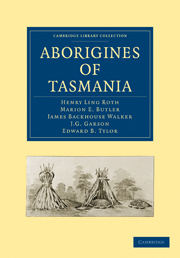Book contents
- Frontmatter
- PREFACE
- Contents
- ILLUSTRATIONS
- CHAP. I INTRODUCTION
- CHAP. II FORM AND SIZE
- CHAP. III PSYCHOLOGY
- CHAP. IV WAR
- CHAP. V FIRE
- CHAP. VI NOMADIC LIFE
- CHAP. VII METHOD OF WEARING HAIR
- CHAP. VIII ASTRONOMY
- CHAP. IX STRING
- CHAP. X TRADE
- CHAP. XI INFANTICIDE
- CHAP. XII LANGUAGE
- CHAP. XIII OSTEOLOGY
- CHAP. XIV ORIGIN
- APPENDICES
- INDEX
- Plate section
CHAP. III - PSYCHOLOGY
Published online by Cambridge University Press: 05 December 2011
- Frontmatter
- PREFACE
- Contents
- ILLUSTRATIONS
- CHAP. I INTRODUCTION
- CHAP. II FORM AND SIZE
- CHAP. III PSYCHOLOGY
- CHAP. IV WAR
- CHAP. V FIRE
- CHAP. VI NOMADIC LIFE
- CHAP. VII METHOD OF WEARING HAIR
- CHAP. VIII ASTRONOMY
- CHAP. IX STRING
- CHAP. X TRADE
- CHAP. XI INFANTICIDE
- CHAP. XII LANGUAGE
- CHAP. XIII OSTEOLOGY
- CHAP. XIV ORIGIN
- APPENDICES
- INDEX
- Plate section
Summary
ANDERSON, the first man who described these people, was not favourably impressed with their intellectual powers, and he records his opinion as follows (Cook's Third Voy. Bk. I. ch. vi. p. 45): “With respect to personal activity or genius we can say but little of either. They do not seem to possess the first in any remarkable degree, and for the last, they have, to appearance, less than even the inhabitants of Terra del Fuego, who, though furnished with the materials, have not invention sufficient to make clothing for themselves. …. Their expressing no surprise at seeing men so unlike themselves, their indifference to our presents, and their general inattention, were sufficient proofs of their not possessing any acuteness of understanding.” He continues: “The inhabitants had little of that fierce or wild appearance common to people in their situation; but seemed mild and cheerful, without reserve or jealousy of strangers.” But some of the settlers looked upon them as little better than wild animals. Thus Lloyd (ch. iv. p. 43) says: “Their moral and intellectual energies were of the most inferior order.” Prinsep says much the same (p. 79): “They are undoubtedly in the lowest possible scale of human nature, both in form and intellect,” and Wentworth is equally emphatic (p. 115) in a like opinion: “The aborigines of this country are, if possible, still more barbarous and uncivilized than those of New Holland.”
- Type
- Chapter
- Information
- Aborigines of Tasmania , pp. 23 - 66Publisher: Cambridge University PressPrint publication year: 2009First published in: 1890

